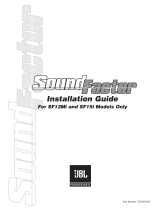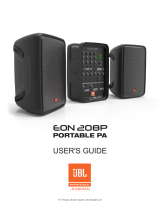13
SYSTEM SPECIFICATIONS
PRX710 PRX712 PRX715 PRX725 PRX735
SYSTEM SPEC
System Type: Self powered two-way 10”
woofer 1” exit compression
driver, bass reflex
Self powered two-way 12”
woofer 1” exit compression
driver, bass-reflex
Self powered two-way 15”
woofer 1” exit compression
driver, bass-reflex
Self powered two-way 15”
woofer 1” exit compression
driver, bass-reflex
Self powered three-way, 15”
woofer, 6.5” midrange, 1” exit
compression driver, bass-reflex
Max SPL Output: Normal: 133 dB
Boost: 133 dB
Normal: 135 dB
Boost: 135 dB
Normal: 136 dB
Boost: 136 dB
Normal: 139dB
Boost: 139 dB
Normal: 136 dB
Boost: 136 dB
Freq Range (-10 dB): Normal: 50 Hz -19.6 kHz
Boost: 42.9 Hz -20 kHz
Main: 44.8 Hz -19.6 kHz
Monitor: 44.8 Hz -19.5 kHz
Main: 42.9 Hz – 19.5kHz
Monitor: 43.6 Hz – 19.3kHz
Normal: 42 Hz – 18.5 kHzBoost:
40 Hz – 18.5 kHz
Normal: 35 Hz – 20 kHz
Boost: 34 Hz – 20 kHz
Freq Response (±3 dB): Normal: 63.5 Hz -18.5 kHz
Boost: 53 Hz -18.6 kHz
Main: 55.7 Hz -18.2 kHz
Monitor: 56.5 Hz -17.7 kHz
Main: 58.1 Hz – 17.2kHz
Monitor: 60.7 Hz – 16.7kHz
Normal: 49 Hz – 17 kHz
Boost: 46 Hz – 17 kHz
Normal: 42 Hz – 20 kHz
Boost: 39 Hz – 20 kHz
Input Connectors: 2 x Balanced XLR / ¼” input, 2 x
unbalanced RCA input
2 x Balanced XLR / ¼” input, 2 x
unbalanced RCA input
2 x Balanced XLR / ¼” input, 2 x
unbalanced RCA input
2 x Balanced XLR / ¼” input, 2 x
unbalanced RCA input
2 x Balanced XLR / ¼” input, 2 x
unbalanced RCA input
Input Impedance: 20K Ohms (balanced), 10K Ohms
(unbalanced)
20K Ohms (balanced), 10K Ohms
(unbalanced)
20K Ohms (balanced), 10K Ohms
(unbalanced)
20K Ohms (balanced), 10K Ohms
(unbalanced)
20K Ohms (balanced), 10K Ohms
(unbalanced)
Signal Indicators: Limit: Yellow LED indicates peak
output has been reached and dsp
limiter is acting
Signal: Green LED indicates signal
present
Power/Standby: Blue indicates
system has power and ready to
pass audio, Red indicates system
has power but is in a power sav-
ing mode and will not pass audio.
Limit: Yellow LED indicates peak
output has been reached and dsp
limiter is acting
Signal: Green LED indicates signal
present
Power/Standby: Blue indicates
system has power and ready to
pass audio, Red indicates system
has power but is in a power sav-
ing mode and will not pass audio.
Limit: Yellow LED indicates peak
output has been reached and dsp
limiter is acting
Signal: Green LED indicates signal
present
Power/Standby: Blue indicates
system has power and ready to
pass audio, Red indicates system
has power but is in a power sav-
ing mode and will not pass audio.
Limit: Yellow LED indicates peak
output has been reached and dsp
limiter is acting
Signal: Green LED indicates signal
present
Power/Standby: Blue indicates
system has power and ready to
pass audio, Red indicates system
has power but is in a power sav-
ing mode and will not pass audio.
Limit: Yellow LED indicates peak
output has been reached and dsp
limiter is acting
Signal: Green LED indicates signal
present
Power/Standby: Blue indicates
system has power and ready to
pass audio, Red indicates system
has power but is in a power sav-
ing mode and will not pass audio.
EQ: Presets for Normal and Boost Presets for Main and Monitor Presets for Main and Monitor Presets for Normal and Boost Presets for Normal and Boost
Dynamic Control (Input): dbx Type IV™ limiter circuit dbx Type IV™ limiter circuit dbx Type IV™ limiter circuit dbx Type IV™ limiter circuit dbx Type IV™ limiter circuit
Crossover
Frequency:
1.9 kHz 1.8 kHz 1.7 kHz 2.4 kHz 480 Hz, 2.0 kHz
AMPLIFIER
Design: Class-D Class-D Class-D Class-D Class-D
Power Rating: 1500W (2 x 750W) 1500W (2 x 750W) 1500W (2 x 750W) 1500W (2 x 750W) 1500W (2 x 750W)
AC Power Input: 100V - 240V~ 50/60 Hz 100V - 240V~ 50/60 Hz 100V - 240V~ 50/60 Hz 100V - 240V~ 50/60 Hz 100V - 240V~ 50/60 Hz
SPEAKER
LF: 1 x JBL M110-4 250mm (10
in) woofer
1 x JBL 272G 305mm (12”)
woofer
1 x JBL 275G (15 in) woofer 2 x JBL 275 (15 in) woofer 1 x JBL 275G 380mm (15 in)
woofer
MF: n/a n/a n/a n/a 1 x JBL 196H 165mm (6.5 in)
horn-loaded midrange transducer
HF: 1 x JBL 2408H-2 37.5 mm (1.5”)
annular polymer diaphragm,
neodymium compression driver
1 x JBL 2408H-2 37.5 mm (1.5”)
annular polymer diaphragm,
neodymium compression driver
1 x JBL 2408H-2 37.5 mm
(1.5””) annular polymer dia-
phragm, neodymium compression
driver”
1 x JBL 2408H-2 37.5 mm
(1.5””) annular polymer dia-
phragm, neodymium compression
driver”
1 x JBL 2408H-2 37.5 mm
(1.5””) annular polymer dia-
phragm, neodymium compression
driver”
Coverage Pattern: 100º x 60º nominal 90º x 50º nominal 90º x 50º nominal 90º x 50º nominal 90º x 50º nominal
Directivity Index (DI): 9 dB 10.2 dB 10.2 dB 10.4 dB 10.5 dB
Directivity Factor (Q): 8 10.4 10.4 11 11.2
Enclosure: Trapezoidal, 18 mm, plywood Asymmetrical, 18 mm, plywood Asymmetrical, 18 mm, plywood Trapezoidal, 18 mm, plywood Trapezoidal, 18 mm, plywood
Suspension/Mounting: Single 36 mm pole socket, 8 x
M10 Suspension Points,
1 x M10 pull back point
Dual 36 mm pole socket, 12 x
M10 Suspension Points
Dual 36 mm pole socket, 12 x
M10 Suspension Points
8 x M10 Suspension Points, 1 x
M10 pull back point
12 x M10 Suspension Points
Transport: 1 x integrated handle with injec-
tion molded backing cup
1 x injection molded handles with
backing cup
1 x injection molded handles with
backing cup
2x injection molded handle with
backing cup
2x injection molded handle with
backing cup
Finish: Obsidian DuraFlex™ finish Obsidian DuraFlex™ finish Obsidian DuraFlex™ finish Obsidian DuraFlex™ finish Obsidian DuraFlex™ finish
Grille: Powder coated, Obsidian, 16
gauge perforated steel with
acoustical transparent black cloth
backing.
Powder coated, Obsidian, 16
gauge perforated steel with
acoustical transparent black cloth
backing.
Powder coated, Obsidian, 16
gauge perforated steel with
acoustical transparent black cloth
backing.
Powder coated, Obsidian, 16
gauge perforated steel with
acoustical transparent black cloth
backing.
Powder coated, Obsidian, 16
gauge perforated steel with
acoustical transparent black cloth
backing.
Dimensions (mm):
(H x W x D) (in):
498.720 x 335.617 x 322.280
(19.63 x 13.21 x 12.69)
612.4 x 384.6 x 341.4
24.11x 15.14 x 13.44
714.4 x 445. x 358.7
28.13 x 17.52 x 14.12
1070.4 x 445 x 538
42.14 x 17.52 x 21.18
952.5 x 445 x 538
37.5 x 17.52 x 21.18
Net Weight: 16.4 kg (36 lb) 19.4 kg (42.5 lb) 21.6 kg (47.5 lb) 37.19 kg (82 lb) 34.9 kg (77 lb)
Full-Range Models






















